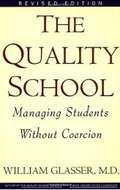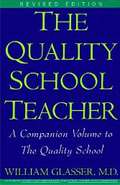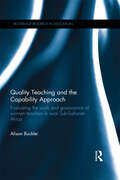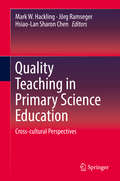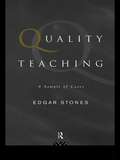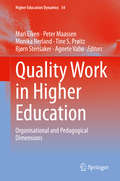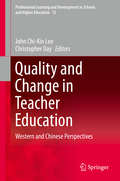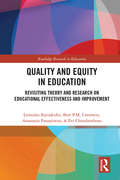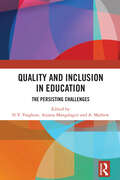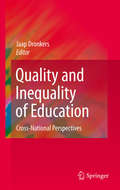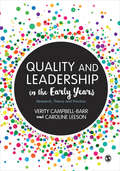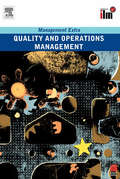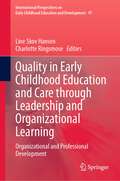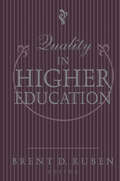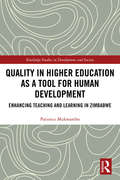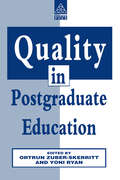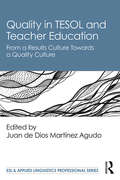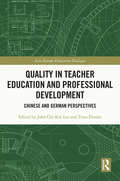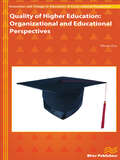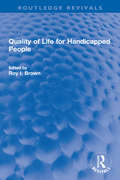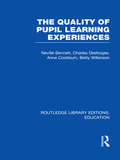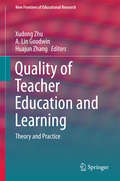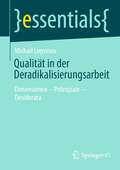- Table View
- List View
Quality School RI
by William Glasser"This should be required reading by every school administator, every teacher, every board member and all university faculty involved in the training of teachers. There is no doubt that we need to squeeze all blame, all coerion and all criticism out of any people-related business. Not until we realize that schools are in a people business will we ever be able to make meaningful changes."--Dr. Albert Mamary, former superintendent of schools, Johnson City, New York
Quality School RI
by William Glasser"This should be required reading by every school administator, every teacher, every board member and all university faculty involved in the training of teachers. There is no doubt that we need to squeeze all blame, all coerion and all criticism out of any people-related business. Not until we realize that schools are in a people business will we ever be able to make meaningful changes."--Dr. Albert Mamary, former superintendent of schools, Johnson City, New York
Quality School Teacher RI
by William GlasserThis book is the follow-up to its immediate predecessor, The Quality School. Based on the work of W. Edwards Deming and on Dr. Glasser's own choice theory, it is written for teachers who are trying to abandon the old system of boss-managing, which is effective for less than half of all students. William Glasser, M.D., explains that only through lead-management can teachers create classrooms in which all students not only do competent work but begin to do quality work. These classrooms are the core of a quality school. The book begins by explaining that to persuade students to do quality schoolwork, teachers must first establish warm, totally noncoercive relationships with their students; teach only useful material, which means stressing skills rather than asking students to memorize information; and move from teacher evaluation to student self-evaluation. There are no generalities in this book: It provides the specifics that classroom teachers seek as they begin the move to quality schools.
Quality Teaching and the Capability Approach: Evaluating the work and governance of women teachers in rural Sub-Saharan Africa (Routledge Research in Education)
by Alison BucklerThis book provides an analytical exploration of the condition of teachers working in expanding school systems across the world, with a particular focus on the lives of women teachers in rural Sub-Saharan Africa. Drawing from award-winning research, it looks beyond the official portrayals of teachers’ lives in order to better understand the reality of the contexts in which teachers live and work. Positioning Amartya Sen’s capability approach at the heart of the study, each chapter considers documentary evidence alongside ethnographic research from rural, remote and under-resourced schools in Ghana, Nigeria, Kenya, South Africa and Sudan. Interweaving rich narratives from teachers in a variety of contexts, the book proposes a concept of professional capability and examines female teachers’ agency to pursue and achieve this in their classrooms. This key examination challenges existing notions of ‘quality education’ and reveals insights into the broader purpose of schooling for rural communities. Quality Teaching and the Capability Approach will be of value to researchers, academics and postgraduate students in education, particularly those concerned with gender, development and teaching, as well as educationalists and policy makers concerned with education and development.
Quality Teaching in Primary Science Education
by Mark W. Hackling Jörg Ramseger Hsiao-Lan Sharon ChenThis edited volume explores how primary school teachers create rich opportunities for science learning, higher order thinking and reasoning, and how the teaching of science in Australia, Germany and Taiwan is culturally framed. It draws from the international and cross-cultural science education study EQUALPRIME: Exploring quality primary education in different cultures: A cross-national study of teaching and learning in primary science classrooms. Video cases of Year 4 science teaching were gathered by research teams based at Edith Cowan University, Deakin University, the Freie Universit#65533;t Berlin, the National Taiwan Normal University and the National Taipei University of Education. Meetings of these research teams over a five year period at which data were shared, analysed and interpreted have revealed significant new insights into the social and cultural framing of primary science teaching, the complexities of conducting cross-cultural video-based research studies, and the strategies and semiotic resources employed by teachers to engage students in reasoning and meaning making. The book's purpose is to disseminate the new insights into quality science teaching and how it is framed in different cultures; methodological advancements in the field of video-based classroom research in cross-cultural settings; and, implications for practice, teacher education and research. "The chapters (of this book) address issues of contemporary relevance and theoretical significance: embodiment, discursive moves, the social unit of learning and instruction, inquiry, and reasoning through representations. Through all of these, the EQUALPRIME team manages to connect the multiple cultural perspectives that characterise this research study. The 'meta-reflection' chapters offer a different form of connection, linking cultural and theoretical perspectives on reasoning, quality teaching and video-based research methodologies. The final two chapters offer connective links to implications for practice in teacher education and in cross-cultural comparative research into teaching and learning. These multiple and extensive connections constitute one of the books most significant accomplishments. The EQUALPRIME project, as reported in this book, provides an important empirical base that must be considered by any system seeking to promote sophisticated science learning and instructional practices in primary school classrooms. By exploring the classroom realisation of aspirational science pedagogies, the EQUALPRIME project also speaks to those involved in teacher education and to teachers. I commend this book to the reader. It offers important insights, together with a model of effective, collegial, collaborative inter-cultural research. It will help us to move forward in important ways". Professor David Clarke, Melbourne University
Quality Teaching: A Sample of Cases
by Edgar Stones Profesor Edgar StonesFirst Published in 2004. Routledge is an imprint of Taylor & Francis, an informa company.
Quality Work in Higher Education: Organisational and Pedagogical Dimensions (Higher Education Dynamics #54)
by Peter Maassen Bjørn Stensaker Monika Nerland Mari Elken Tine S. Prøitz Agnete VabøThis book focuses on quality work in higher education, and examines the relationship between the organizational and pedagogical dimensions of quality work in higher education. Bringing together different disciplinary traditions, including educational science, sociology, and organisational studies, it addresses the following principal research question: How is quality work carried out in higher education?The book addresses a wide variety of academic, administrative and leadership practices that are involved in quality work in higher education institutions. The chapters in this book examine core issues crucial in the design and content of study programs, such as modes of teaching, learning and curricula design, as well as institutional practices regarding assessment and quality enhancement. The introductory and concluding chapter present an overarching focus on quality work as a lens to analyse intentional activities within higher education institutions directed at how study programmes and courses are designed, governed, and operated.
Quality and Change in Teacher Education
by John Chi-Kin Lee Christopher DayHow teachers may be better educated for a changing global world is a challenge that faces many systems of education worldwide. This book addresses key issues of quality and change in teacher education in the context of the new public management achievement agendas which are permeating teacher education structures, cultures and programmes and the work of teacher educators internationally. Graduate schools of education in the United States and the UK, for example, are making fundamental changes in the structures, courses, programs and faculties that prepare beginning teachers each year. Drawing upon examples from the United States, United Kingdom, China, Hong Kong, Australia and elsewhere, its authors provide a unique critical overview of emerging themes and challenges of raising the quality of teaching and the quality of student learning outcomes. They suggest possible ways forward for teachers, teacher educators, researchers and policy-makers as they seek to raise the quality of teaching and student outcomes whilst sustaining their moral purposes and values of equity, inclusion and social justice. Taken together, the chapters contain informed, critical discussions of "normal education" and "teacher education" of "professional standards", "4+2/+1" post-degree training, "PGDE versus BEd", integration of subject specializations and professional education. Each one provides new visions of the teacher as a professional and to cultivate high quality teachers in the West and the Greater China region. For all those interested in issues of quality, change and forward movement in teacher education in contexts of policy led reform, this is a must read.
Quality and Equity in Education: Revisiting Theory and Research on Educational Effectiveness and Improvement (Routledge Research in Education)
by Leonidas Kyriakides Evi Charalambous Bert P.M. Creemers Anastasia PanayiotouQuality and Equity in Education draws attention to the importance of developing and testing theories of educational effectiveness and using these theories for improvement purposes. It makes a major contribution to knowledge and theory building in research on promoting quality and equity in education. The book presents an improved version of the dynamic model of educational effectiveness based on the empirical data emerged from studies testing its validity, claiming that the proposed theory can be used for establishing links between educational effectiveness research and school improvement. Towards that end, the book presents the Dynamic Approach to teacher and school improvement, demonstrating its impact on quality and equity in education. The book not only proposes an agenda for further research on developing and testing the dynamic theory of educational effectiveness but also refers to research methods that can be used to test the assumptions of this theory and search for relevant cause and effect relations. The agenda also refers to the need of identifying the conditions under which the dynamic approach to teacher and school improvement can have an effect on student learning outcomes. This book will be of great interest for academics, researchers and postgraduate students working in education research and the area of quality and equity in education. It will also be of interest to policymakers, school advisors and other stakeholders in education.
Quality and Inclusion in Education: The Persisting Challenges
by N. V. Varghese Anjana Mangalagiri A. MathewThis book calls for an equitable and qualitative access to education for all. It proposes paradigms of educational governance that are based on coalition building between key stakeholders, are grounded in local and cultural contexts, sensitive to the language needs of communities. It underlines the significance of gender sensitive and inclusive approaches that ensure equity for marginalized children and minorities. Based on research-based studies, the volume focuses on equity, quality, and learning — covering a broad spectrum, from school to higher, to adult education. It discusses the multiple learner deprivations amongst the marginalized communities and the severe impact of events such as pandemics that exacerbate learner inequities and the recent developments in India under the National Education Policy 2020. It also presents research-based country experiences in the Asian (India, Bangladesh, China) and African (Ghana, South Africa) contexts, showing how external influences on the changing priorities in policy perspectives cut across developing countries. Compiled in honour of Professor R. Govinda, this volume of insightful articles will be of interest to students and researchers of educational policy and studies, sociology of education, equity and human rights. It will also be useful for decision makers and think tanks.
Quality and Inequality of Education
by Jaap DronkersThis cogent analysis of data on education and society from a variety of sources sets out to provide answers to scientific and policy questions on the quality of education and the way it relates to various forms of inequality in modern societies, particularly in Europe. The authors examine not only the well known cross-national PISA datasets, but also the European Social Survey and TIMSS, going further than many researchers by folding into their analyses economic, legal and historical factors. Most research up to now using the PISA data is restricted to educational research. Interesting as that educational question is, the chapters here use the PISA, and other data, to explore more profoundly the relationship between education and the various forms of inequality in European and other modern societies. The work comes from two different perspectives: one that looks at how the different characteristics of societies, their economies, and their educational systems influence the average educational achievements of specific groups of pupils, such as immigrants, in those societies; and a second, which explores how, and in what degree, the characteristics of schools, educational systems and labour-markets either hardens or softens differences in the educational outcomes of various groups of pupils. With a special feature of the book being its emphasis on comparing Asian and European countries, and with the content free of the political constraints that can often attend studies of these datasets, this book will be an vital resource for educationalists and policy-makers alike.
Quality and Leadership in the Early Years: Research, Theory and Practice
by Caroline Leeson Dr Verity Campbell-BarrDo you need good leaders to achieve good quality or does good quality create good leadership? Quality is a term frequently used to describe early years provision without any further explanation of exactly what this 'quality provision' looks like or how it can be achieved. This book not only unpicks what is meant by the term 'quality' in England, across the UK, and beyond, but it does so in the context of how to lead in order to develop and achieve quality. In exploring quality and leadership and the ways in which both terms have been conceptualised from a range of different perspectives you will be able to find a meaning that is right for you and your practice. With chapters covering: · The global interest in quality · The broad nature of early childhood leadership · Reflective evaluation and practice This book will be of interest to setting and room leaders across the early years as well as students studying early childhood or in early years teacher training.
Quality and Leadership in the Early Years: Research, Theory and Practice
by Caroline Leeson Verity Campbell-BarrDo you need good leaders to achieve good quality or does good quality create good leadership? Quality is a term frequently used to describe early years provision without any further explanation of exactly what this ′quality provision′ looks like or how it can be achieved. This book not only unpicks what is meant by the term ′quality′ in England, across the UK, and beyond, but it does so in the context of how to lead in order to develop and achieve quality. In exploring quality and leadership and the ways in which both terms have been conceptualised from a range of different perspectives you will be able to find a meaning that is right for you and your practice. With chapters covering: · The global interest in quality · The broad nature of early childhood leadership · Reflective evaluation and practice This book will be of interest to setting and room leaders across the early years as well as students studying early childhood or in early years teacher training.
Quality and Operations Management Revised Edition: Revised Edition (Management Extra Ser.)
by ElearnManagement Extra brings all the best management thinking together in one package. The series fuses key ideas with applied activities to help managers examine and improve how they work in practice. Management Extra is an exciting, new approach to management development. The books provide the basis for self-paced learning at level 4/5. The flexible learning structure allows busy participants to study at their own convenience, minimising time away from the job. The programme allows trainers to quickly plan and deliver high quality, business-led courses. Trainers can select materials to meet the needs of their delegates, clients, and budget. Each book is divided into themes of ideal length for delivering in a training session. Each theme has a range of activities for delegates to complete, putting the training into context and relating it to their own situation and business. The books’ lively style will stimulate further interest in the subjects covered. Guides for further reading and valuable web references provide a lead-in to further research. Management Extra is based on the NVQ framework to ease the creation of Diploma, Post Graduate Diploma or NVQ programmes for managers. It is accredited with all leading awarding bodies.
Quality in Early Childhood Education and Care through Leadership and Organizational Learning: Organizational and Professional Development (International Perspectives on Early Childhood Education and Development #41)
by Charlotte Ringsmose Line Skov HansenThis book provides insights in to how high quality learning environments in Early Childhood Education and Care (ECEC) develop, and how competent systems can support this. It builds on the knowledge that quality early environments shape the wellbeing and development of the child, and explores how communities of professional practice that support quality development are built. Acknowledging that the conditions for providing high quality pedagogical work depend not only on the individual teacher, but also on collaboration and organizational and professional development. The book draws on a range of theoretical frameworks and research that underline competent systems rather than individualized learning as a path to improve workforce quality and professionalization in the field of ECEC.
Quality in Higher Education
by Brent D. RubenThe concept of quality in higher education is by no means a new one. By one set of definitions or another, colleges and universities throughout the world have always held the pursuit of excellence as their primary goal. Why then has the quality approach, developed and popularized in industry, and how increasingly applied in health care and government, receiving so much attention in higher education at this moment? What does this perspective add to the approaches to excellence with which they have long embraced?These are the two primary questions that this book seeks to address. Chapters and contributors include: "The New Productivity" by Peter F. Drucker; "World War n and the Quality Movement" by J. M. Juran; "The Quality Approach to Higher Education: Context of Concepts for Change" by Brent Ruben; "The Big Questions in Higher Education Today" by L. Edwin Coate; "An American Approach to Quality" by Marilyn R. Zuckerman and Lewis J. Hatala; "Quality hi Higher Education: Critical Issues in Definition and Assessment" by Brent Ruben; and "Ten Areas for Future Research in Total Quality Management" by A. Blanton Godfrey. The volume is graced with an opening essay by Francis L. Lawrence, president of Rutgers University.Higher education is in the public spotlight today due to the many challenges it now faces: rising tuition costs; frustration about a tight job market for graduates; calls for increased faculty productivity; concerns about political correctness; and criticisms regarding the use of grant and research funds, among others. Quality in Higher Education is a particularly timely book that will greatly benefit educators, university administrators, students, and sociologists, and all those who are interested in higher education today.
Quality in Higher Education as a Tool for Human Development: Enhancing Teaching and Learning in Zimbabwe (Routledge Studies in Development and Society)
by Patience MukwamboWhilst many studies have explored how quality in higher education is conceptualised in the Global North, less attention has been paid to quality in higher education in Africa and the Global South. This book uses the human development and capabilities approach to demonstrate how quality in teaching and learning contributes to a range of benefits, such as improved wellbeing, economic outcomes, political engagement, and human capital formation amongst graduates. The book interrogates the various dimensions of quality as well as factors that impact on the realisation of quality in universities and society at large. Recognising that measures of quality are context and stakeholder specific, the book uses the Zimbabwean context as a Global South case study. It evaluates how quality is conceptualised and operationalised in Zimbabwean universities, and how that impacts on teaching and learning policy and practice. The book also demonstrates the need for economic resources for individuals and universities, and emphasises the importance of a social and educational environment conducive to critical learning, and post-university opportunities. This book will be of interest to researchers across Education, African and Development Studies, as well as to policymakers and practitioners with an interest in quality assurance and the promotion of teaching and learning in universities in the Global South.
Quality in Postgraduate Education
by Ortrun Zuber-Skerritt Yoni RyanThis text is designed to respond to the uppermost area of concern in postgraduate education today - that of achieving quality. The book discusses issues of quality and research culture, including criteria for evaluating theses and research applications, and women and overseas students.
Quality in TESOL and Teacher Education: From a Results Culture Towards a Quality Culture (ESL & Applied Linguistics Professional Series)
by Juan de Dios Martínez AgudoThis volume takes a holistic view of the current trends and challenges in quality and quality assurance in TESOL and teacher education. Bringing together top scholars in the field from all over the world, the text features invaluable international perspectives with the common objective of improving the quality in TESOL and teacher education in constantly changing and challenging educational contexts globally. Grouped into four wide-ranging, thematic sections – on multilingualism, diversity, teacher education, and future challenges – the book addresses new obstacles faced by educational professionals in today’s rapidly changing educational landscape by offering alternatives to quantitative targets. Chapter authors cover a range of contexts and timely issues, including technology in the classroom, culturally relevant teaching, teaching for continuous improvement, professional development, and monitoring and evaluating quality. Providing a forum of discussion on the intricacies, complexities, and challenges related to the urgent question of quality in the field, this book is a must-read for prospective ESL/EFL teachers and teacher educators.
Quality in Teacher Education and Professional Development: Chinese and German Perspectives (Asia-Europe Education Dialogue)
by John Chi-Kin LeeThis book addresses the past and changing contexts of Chinese and German teacher education under the impact of globalization and echoes "quality" issues of teacher education. This edited book provides a comprehensive discussion on other issues in the management and implementation of change in teacher education related to teacher education curricula for professional development of teachers. A combination of chapters provides an overview, a review of literature and research as well as offering examples of teacher education practice and updated empirical research on these topics co-edited by two senior scholars and written by experts from Mainland China (including Hong Kong ) and Germany. The volume addresses key issues on teacher standards, ICT in education and e-learning in teacher education, STEM education, vocational teacher education, university-school partnership in teacher education and teaching Chinese or German as a second language. This is an up-to-date academic book to look at profound issues related to quality in teacher education and teachers’ professional development in mainland China and Germany. It will be a useful reference for graduate students and researchers in the field of international and comparative education, teacher education and curriculum studies, teacher educators and practitioners to learn from trends, best practice and challenges that have been encountered in Mainland China and Germany.
Quality of Higher Education: Organizational and Educational Perspectives
by Yihuan ZouQuality in higher education was not invented in recent decades – universities have always possessed mechanisms for assuring the quality of their work. The rising concern over quality is closely related to the changes in higher education and its social context. Among others, the most conspicuous changes are the massive expansion, diversification and increased cost in higher education, and new mechanisms of accountability initiated by the state. With these changes the traditional internally enacted academic quality-keeping has been given an important external dimension – quality assurance, which requires higher education institutions to continuously demonstrate and improve performance, and which also provides new systems of rewards and sanctions. However, the complex impacts of quality assurance policies have shown a need to further understand the quality issue in higher education.This book is about constructing a more inclusive understanding of quality in higher education through combining the macro, meso and micro levels, i.e. from the perspectives of national policy, higher education institutions as organizations in society, individual teaching staff and students. It covers both theoretical constructions for understanding quality and empirical investigation in the Chinese context. The questions addressed are: How is quality of higher education perceived by the institution, teaching staff and students, respectively? What are the main concerns for the institution, teaching staff and students in their own pursuit of quality? It has been concluded that quality of higher education is not only about educational quality, but also about expanding life chances for the students, prosperity in the administrative system for the teaching staff,and organizational prosperity for the institution. With regard to quality assurance and accountability in higher education special attention should be given to the values pursued and be careful to balance between immediate, single-value efficiency and sustainable development and a wider-range of values that higher education serves.
Quality of Life for Handicapped People (Routledge Revivals)
by Roy I. BrownFirst published in 1988, Quality of Life for Handicapped People examines developments and innovations in research and practice concerning the quality of life for those with disabilities. The book centres on the topic of rehabilitation education, with a particular focus on issues relating to quality of life, including what is meant by ‘quality of life’ and the measures and systems required to assess the variables involved. It highlights the significance of rehabilitation education in underlining the key issue of how individuals feel about themselves and how they perceive the services available to them for the purpose of rehabilitation. It considers the importance of environment and the improvement of environment in increasing quality of life, and examines a range of vocational and social programmes from a variety of perspectives. Quality of Life for Handicapped People will be of use to those with an interest in the history and development of rehabilitation education.
Quality of Pupil Learning Experiences (Routledge Library Editions: Education)
by Anne Cockburn Neville Bennett Charles Desforges Betty WilkinsonVery little is known about the quality of the learning experiences provided for pupils. This book contains the results of a major research project, conducted in a sample of English primary schools, in which particular attention was paid to the tasks children were assigned, to the degree of match between assigned tasks and pupil attainment, to the detailed observation of children at work. The teacher’s problems in assigning work appropriate to children’s attainments and the special problem of matching posed by the transfer of children from one class to another were also subjected to analysis. Lessons learned from the project were used as a basis for the design of an in-service course for teachers. The course, which was aimed at improving teachers’ matching skills was closely evaluated. The report contains data and analysis pertinent to each of the above issues. The findings reveal that despite the conscientious efforts of able teachers a number of serious issues are apparent – particularly in areas such as classroom organization and teacher diagnosis of children’s work.
Quality of Teacher Education and Learning
by A. Lin Goodwin Xudong Zhu Huajun ZhangThis edited book is on the theory and practice of teacher education from the most distinguished and experienced scholars in the field around the world. In this book, they explored the most urgent and significant issues in teacher education in this globalized time. The dealing of these issues can directly impact the quality of teacher education and education in general. How to improve the quality of teacher education is a global issue that many countries, no matter developed or developing, face. This book provides multiple perspectives to address the challenges and possibilities for improving teacher quality. A point needs to further highlight in this book is that the researchers pay more attention to the inner landscape of teachers, such as the issue of identity, sense of person, etc. In this book, the readers can learn the insights and multiple perspectives of the best scholars in teacher education.
Qualität in der Deradikalisierungsarbeit: Dimensionen – Potenziale – Desiderata (essentials)
by Michail LogvinovDieses essential behandelt Potenziale und Handlungsbedarfe der Qualitätsförderung in der Deradikalisierungsarbeit. Durch die Benennung einzelner Qualitätsdimensionen und -kriterien wird ein praxisorientierter Beitrag zu den kontrovers diskutierten Themen Qualität, Wirkung und Effektivität von Maßnahmen geleistet. Als Vergleichsgrundlage fungieren dabei die Qualitätsdebatte in der Sozialen Arbeit, englischsprachige Forschungen zur Effektivität und Leistungsfähigkeit von Non-Profit-Organisationen, die Qualitätssicherung in der Kriminalprävention und die evidenzorientierte Erforschung der Umsetzungsqualität von Resozialisierungsprogrammen. Im Ergebnis wird eine Reihe von Ansätzen, Standards, Indikatoren und Prädiktoren diskutiert, die für die interne Qualitätsentwicklung der Fachpraxis einen Mehrwert ergeben.
